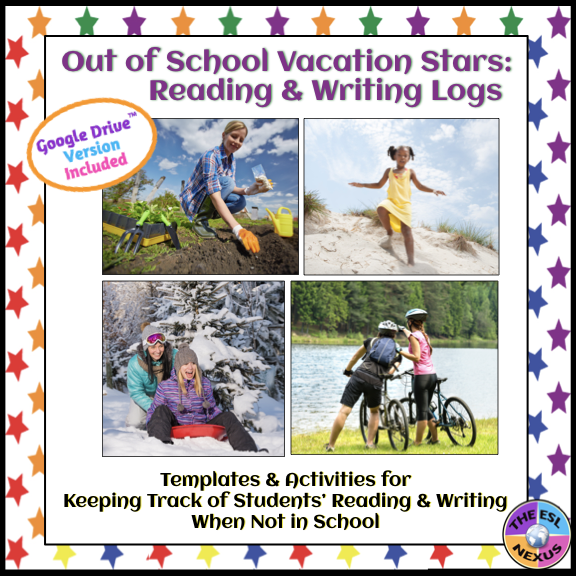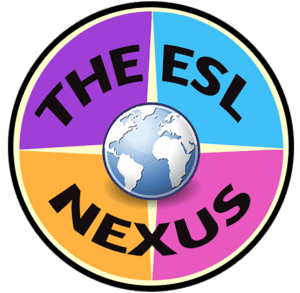Are you affected by the school closings due to the coronavirus pandemic? This blog post offers you some tips for teaching English Language Learners remotely. I’d also like to give you some links to resources you may find useful. (More resources are being posted on my Facebook page.)
 |
| Click HERE for a free resource about reading & writing logs; source: The ESL Nexus |
Tips for Teaching ELLs Remotely
* If you are making videos for your students to access at home or are teaching through a streaming platform, please speak more slowly and clearly than you typically do. It is hard enough for ELLs to process material they hear in a classroom with a live teacher – listening through a computer or other device makes it even more difficult.
* ELLs may not understand the work they are given. If they are not able to ask you for an explanation or how to do it, they shouldn’t be penalized if they do not complete the tasks.
* Remember that the adults in the family may not be able to help their children do work that is assigned. The adults may not know enough English or they may have jobs they still have to go to and aren’t home to help their children.
* Encourage the parents and caregivers of ELLs to read to their children in the adults’ native language. Students will get the benefit of hearing good modeling of language and it will probably be easier for the adults to discuss the books with their kids as well. Doing this will help the ELLs develop their reading skills because the skills developed in one language will transfer over to English.
* Some ELLs may only be able to access the Internet with a smartphone. (That was the case with a few of my students.) If they don’t have a computer or even a tablet for their work, it may be difficult for them to do the work the way you want or expect. Please understand that the students are trying their best, just like you.
A recent article from Edutopia describes how an American teacher and her colleagues, whose students are in China, went online to teach their classes. There are lots of specific ideas here that will be very helpful if you are in this situation. You can read the article HERE.
The Canadian Ministry of Health has information in 30 languages available on an Ontario, Canada, government website. This is very helpful if your ELLs’ families do not understand English well. There is other info in English on this page specifically for Canadians; click HERE to go to the clickable list of languages at the bottom of the webpage.
Resources to Help Educators
One of my resources, Out of School, Vacation, and Holiday Writing & Reading Logs, is now free for a limited time. It had been a paid product but I think this is something students can easily use at home so while the Covid-19 pandemic is forcing schools to be closed, it will be free. I also added a digital component to the resource: You can now access it with your Google Drive account. Please click HERE to get your copy.
 |
| Click HERE to get this resource; source: The ESL Nexus |
I have created a Custom Category in my TpT store that lists all the resources I think can be used by students at home. It’s called Unexpected School Closing & Distance Learning Resources. These are not new resources, just ones that I think you might find helpful at this time or whenever your school is closed for an extended period of time. I’ve added instructions for how you can use each resource remotely with your students. Most resources require a teacher to explain what to or to do some advance prep so please read the product descriptions carefully. There may be some parts of a resource that aren’t relevant for teaching remotely but if the bulk of it is, then it was added to this custom category. Many resources need to be printed out, by you or your students if they have printers, but many also include Google Drive versions as well as printable versions. Please click HERE to go to this webpage in my TpT store.
The State of Arizona has created a Virtual Resource Hub
with about 125 general education, English, math, science, social
studies, world language, and special education resources. You can find
it HERE.
Global Storybooks is a website that offers books in over 50 languages that students can read for free. The books can also be downloaded. Click HERE to access the website.
Unite for Literacy is a free online library with over 400 books that are narrated in English. It is aimed at elementary students. You can find it HERE.
This article has links to 12 Virtual Museum Tours that are free. They are useful even if you’re not teaching from your home. And the National Park Service in collaboration with Google has made available free virtual tours that you can find HERE.
Epic is an online library with, it says, over 35,000 books aimed at students aged 12 and under. Click HERE to go find out how your students can access the books for free until the end of the school year.
I hope this helps you at least a little during this uncertain time. Stay safe and best wishes to you and your students!




